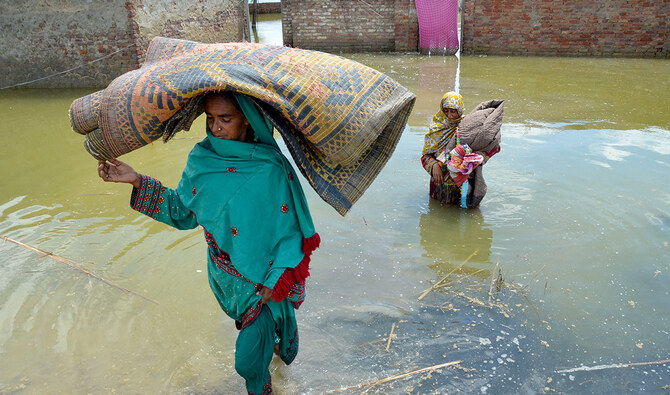ISLAMABAD: Pakistan’s National Disaster Management Authority (NDMA) on Wednesday forecast heavy monsoon rains in the northwestern Khyber Pakhtunkhwa (KP) and Punjab province till Aug. 24, with the downpours killing 220 and injured 416 across the country since July.
Heavy monsoon rains have triggered rains and flash floods in many parts of Pakistan since July, particularly KP and Punjab. As per the latest NDMA report, Punjab has reported the highest number of casualties from rain-related incidents with 89 deaths followed by KP with 65 casualties since July 1.
The southern provinces of Sindh and Balochistan have reported 39 and 18 deaths from rain-related incidents, respectively, while Azad Kashmir has reported five deaths and the northern Gilgit-Baltistan region four deaths since July.
“National Emergency Operations Center (NEOC) of NDMA anticipated more rain wind/thunderstorms and heavy downpours in Khyber Pakhtunkhwa and isolated rainfall in Punjab from 21st to 24th August 2024,” the NDMA said in its latest advisory.
It cautioned that rains may cause increased flows in local nullahs and river tributaries. The disaster management body said Increased flows may cause flash floods in Abbottabad, Parachinar, Charbagh, Charsadda, Chitral, Dir, Haripur, Hazara, Malakand, Mansehra, Mardan, Peshawar, and Swabi districts of KP.
Meanwhile, it said heavy rainfall is expected in the Potohar region, twin cities of Islamabad and Rawalpindi, Bahawalpur, DG Khan, Faisalabad, Gujranwala, Gujrat, Hafizabad, Jhelum, Lahore, Layyah, Mianwali, Multan, Narowal, Rahimyar Khan, Sialkot and Sargodha districts of Punjab.
NDMA warned authorities and the public to take all necessary precautions to mitigate the potential impacts of flooding and landslides.
“NDMA issued instructions to all relevant departments to alert Emergency Response Teams and mobilized resources to ensure a swift response to any arising situations,” the advisory said. “Tourists are advised to avoid traveling to these areas during the forecasted period.”
Pakistan is recognized as one of the most vulnerable countries to climate change effects. This year, the South Asian country recorded its “wettest April since 1961,” with 59.3 millimeters of rainfall while some areas of the country faced a severe heat wave in May and June.
In 2022, unusually heavy rains triggered flash floods in many parts of Pakistan, killing over 1,700 people, inflicting losses of around $30 billion, and affecting at least 30 million people. Scientists have attributed Pakistan’s erratic weather patterns to climate change effects and called on countries around the world to take urgent steps to tackle the crisis
















